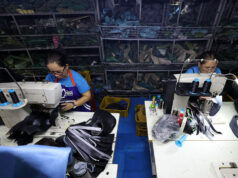What lies ahead for the Philippines on China’s Belt and Road Initiative?
By Camille A. Aguinaldo
Reporter
PRESIDENT Rodrigo R. Duterte sought warmer ties with China at the outset of his presidency, at a time when China was on its way with its ambitious global infrastructure program called the Belt and Road Initiative (BRI).

The Philippine government’s Build, Build, Build infrastructure program thus coincides with China’s BRI, which is seen by the Philippine government as among the available mechanisms in addressing the country’s infrastructure needs. To be sure, this funding support needs to be further activated beyond China’s earlier pledge of $24 million in investments and the memoranda of understanding (MoUs) with the Philippines that marked Chinese President Xi Jinping’s state visit to Manila last November.
Global think tank Nomura, in its April 2018 report, noted that the Philippines and Malaysia will have the most to gain among Southeast Asian economies from China’s BRI. With these in mind, how should the Philippines capitalize on the Belt and Road Initiative?
NO ‘IMMEDIATE IMPACT’
The BRI has two elements: the Silk Road Economic Belt, which is focused on linking China to Central Asia, Russia and Europe, through building land transportation routes; and the 21st Maritime Silk Road, which connects China to shipping routes starting from its coast, then passing through the contested South China Sea, the Indian Ocean, then leading up across the globe to Europe.
In a lecture in Beijing last August with Asian journalists, chief economist Chen Wenling of the China Center for International Economic Exchange (CCIEE) described the BRI as a “symbol of friendship, trade exchange and cultural exchanges” with other countries.
“We want to transfer our wealth. We want to transfer our great experience with our developments (with) these kinds of developments,” Ms. Chen said. “You as a host nation, if you want to develop, China is more than willing to help you to achieve that goal.”
But the gains have yet to be felt two years into Mr. Duterte’s presidency. George T. Barcelon, president of the Philippine Chamber of Commerce and Industry (PCCI) at the time of this interview, noted, in particular, that port development projects have yet to be undertaken, the same point underscored by Nomura.
“I don’t see (an) immediate impact to us,” Mr. Barcelon said. “I don’t see too much on (the) maritime silk road” — which Mr. Xi himself had glowingly remarked on — “that will benefit us soon,” the business leader also said.
Nevertheless, “(f)or us, it’s really the Maritime Silk Road that we would see the benefit of joining,” Mr. Barcelon said. “In other words, there are ports that have to be built, which really coincide with some of our Build, Build, Build. But again, maritime trading is important because China is globally (among) the biggest exporters. And we do export a lot also. We do import a lot (from) China.”
“All industries — manufacturing, agriculture, aqua — all of this, once you have all this efficiency in the maritime transport, the impact would be great on anything that requires maritime logistics.”
For his part, Employers Confederation of the Philippines (ECoP) acting president Sergio R. Ortiz-Luis, Jr. said he sees advantages in China’s BRI from the few conditions it offers in carrying out development projects, unlike foreign loans offered by other countries and financial institutions.
“Definitely the advantage of this one is unlike (other foreign assistance),…many of them have conditionalities which we cannot comply with. In here, there is none. And the market that will be opened for us is quite big. And therefore, it’s easier to be in this and profit from it,” he told BusinessWorld in a phone interview.
“This is a chance to really ensure our infrastructure projects will push through,” he added.
Asia-Pacific Pathway to Progress program convenor Aaron Jed Rabena pointed out in a phone interview that China’s BRI is more than the infrastructure projects. He said China’s interconnectivity goals under the BRI also covers policy coordination, trade and investments, financing, and people-to-people ties, which the Philippines could explore.
The Philippines and China have also gained ground on the other aspects of BRI, Mr. Rabena noted, such as the country’s joining China’s Asian Infrastructure Investment Bank (AIIB), currency swap deals, and tourist exchanges. Partnerships and agreements were also secured by both the public and private sector with the Chinese government and companies, such as the Bilateral Consultation Mechanism of the two governments, the six-year development program for trade and economic cooperation, and the increasing direct air routes, among others.
On infrastructure developments, if observers have cited the slow pace of projects earlier pledged by China, Mr. Rabena believes this was not due to the Philippine government’s missteps.
“Some projects, not all, are taking some (time) to materialize because the government is being thorough and careful in studying their prospects,” he said in an e-mail.
Ateneo De Manila University Chinese studies lecturer Lucio B. Pitlo III said China could also invest in the Philippines in sectors where the Asian power has made tremendous achievements, such as renewable energy, shipping, e-commerce and financial technology.
“China just set up its own development cooperation agency this year and this adds to our pool of bilateral and multilateral development partners. This agency can help in our capacity building to conduct feasibility studies, project planning and other preparatory work for a wide range of public projects,” Mr. Pitlo said in an e-mail.
CHINA’S INFLUENCE
From China’s view, Ms. Chen cited the planned joint development of the two countries in the South China Sea but noted bigger opportunities for business cooperation, as analysts have also pointed out.
“The bilateral relations between governments are many projects and agreements, including the development in (the) South China Sea, which will bring great economic benefit for the Philippines,” she said. “I believe that in the future, there’s still great potential not only in the government side, but the bigger opportunity lies in the business cooperation.”
Heilongjiang Department of Commerce division director Li Leyu also said in an August press briefing with Asian journalists that they are seeking as well to reestablish ties with the Philippines to explore business opportunities.
In turn, Ms. Chen raised concerns among Chinese businessmen about the political situation in the Philippines.
“I think we should give a better sense of security for investors who (are) doing business in the Philippines and…reassure that their investment is safe and there will not be major setbacks and political risks,” she said.
Austin Ong, an analyst in the Integrated Development Studies Institute (IDSI), said the Philippines stands to benefit from China’s BRI, citing the real estate boom and the increasing number of Chinese tourists in the country which helped provide additional income to the private sector and Filipinos workers.
But despite the promising benefits of the initiative, Mr. Ong said the Philippines should also do its part in order to make the most of the global developments.
“The Belt and Road Initiative is a vehicle that the Philippines can ride on to fast-track its development. But the homework, the hard work, the studies, we have to do it ourselves,” he said in a phone interview.
Mr. Ong said skills need to be improved among Filipino workers in order for them to keep up with the influx of investments coming into the Philippines and to address the shortage in skilled labor.
Domestic issues that have also hounded the Build, Build, Build infrastructure program, such as the bureaucratic red tape and right-of-way problems, should also be addressed so the Philippines can take advantage of the BRI, Mr. Ong added.
However, International studies professor Renato C. De Castro of De La Salle University warned that China’s influence on the Philippines through the BRI may eventually lead to giving China the reins in Philippine foreign policy.
“Beware of the Chinese giving gifts because those gifts, of course, they have a cost….Those projects will be undertaken by Chinese corporations bringing in Chinese workers and Chinese workers and Chinese materials, so not a single cent would leave China. This is how the Chinese operate. That’s why they’re being criticized by other developed countries,” he said in a phone interview.
“Second, of course, will be the impact of the debt trap….Then it’s what you call economics statecraft. Eventually you will be beholden to China. China will have influence in your foreign policy,” Mr. De Castro added.
Economic managers have allayed concerns that the Philippines will fall into the much feared debt trap. Budget Secretary Benjamin E. Diokno has said the Philippines has a “very low debt-to-GDP (gross domestic product) ratio,” which places the country at an advantage to pay off its debt.
The United States itself has repeatedly criticized China over its financing support to other countries as having “hidden strings attached.” In fact, the Western power has initiated its own investment program in the Asia-Pacific with the passage of the BUILD Act and with infrastructure agreement with Japan and Australia, as if to counter China’s influence through the BRI.
DUE DILIGENCE
Ms. Chen dismissed US criticisms as a “strategic fear and strategic anxiety.”
“This kind of financing investment is by no means a debt trap, but a golden development opportunity for these countries. This so-called debt is a choice of the host nation, instead of something that is forced upon on these countries by any investment, organization,” she said in Chinese.
“This is only our initiative and we are doing what we can do to help this endeavor move forward,” she added. “So our goodwill and our contribution should be more appreciated and recognized by the international community.”
“We are not seeking praise but we hope that our effort will be respected.”
But Mr. Rabena believes a debt trap will not be among the country’s problems. He and Mr. Pitlo said the government should watch out for “white elephants” when it comes to China-funded projects.
“White (elephant) projects, meaning projects made but not operational — a waste of money,” Mr. Rabena said.
Both business leaders and analysts maintain that the Philippine government should observe due diligence in carrying out projects with China to ensure a win-win situation.
For Mr. Barcelon, due diligence must be done on the financing terms, the practicality of the projects. This has, indeed, been the prevalent advice, in the light of the much discussed fears of a debt trap with China, with Sri Lanka often cited as an example.
“The bidding process should ensure that the private sector is (financially) capable, so that if they…partner, especially with China, there wouldn’t be inconveniences,” Mr. Ortiz-Luis said for his part.
“Meticulous conduct of feasibility studies, multi-stakeholder consultations and engagement,” Mr. Rabena said.
Mr. Pitlo said the Philippine government should also field in competent negotiators “to ensure terms and conditions are not disadvantageous to us and that risks are mitigated.”
“Each foreign partner or donor has their own respective advantages and disadvantages that we should be aware of. Our fast growing economy, sound fundamentals, promising economic outlook and presence of more partners and investors give us leverage in negotiating with China or other development partners,” he said.
Chinese companies in partnership with the Philippines should also be asked “to employ Filipinos in the non-technical aspects of projects,” Mr. Rabena also suggested.
Mr. De Castro stressed the importance for civil society organizations to ensure that the Philippines will not be left burdened with Chinese debt and for the Filipinos to scrutinize every aspect of the China-funded projects that might affect communities.
Another move that the Philippines as a soft power should do is to “balance big powers with other big powers,” like maintaining relationships with the US and Japan, to prevent the country from being economically tied with China, he added.
“We should not allow our government to sell future generations of Filipinos to China because the government, especially this government, is always thinking in terms of short-term,” Mr. De Castro said.
For Mr. Ong, the Philippine government should not be alone in ensuring the success of projects the country needs for development. He said the private sector and the rest of Filipinos should be involved in the process as well.
“The government has to be vigilant, do its homework, and work with the private sector,” he said.
“The rest is up to us. The people have to do their part,” he added.



